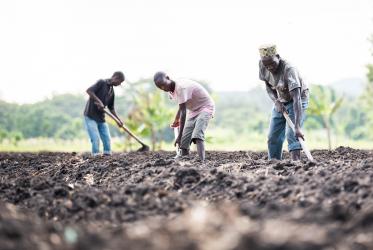"It is both connected to the river delta and the ocean, which connects our islands not only to the vast blue Pacific continent of large ocean states but also by the sea to all of you," explained Bhagwan.
The United Nations has declared 2022 as The International Year of Artisanal Fisheries and Aquaculture.
Aquatic foods
Blue, or aquatic, foods, the term used for fish, shellfish, aquatic plants and algae captured or cultivated in freshwater and marine ecosystems, has a crucial role as food and in the well-being and livelihood of 3 billion people worldwide.
"Our aqua systems are not only food systems, but life systems, creating oxygen-transporting nutrients. They're both resilient and fragile at the same time," said Bhagwan.
He said that within the narrative of the blue economy, the rivers and lakes and especially the oceans are seen as the final frontier for extractive exploitation.
"And much of our indigenous culture, spirituality and identity flow with the oceans’ tides, with our rivers connecting our relationships, and regulating our very existence through long-term ocean health," said Bhagwan.
"We pray in the name of our Lord Jesus, who taught on the shores of Galilee, who worked on the stormy sea, and who, as the Risen calls us today, to show faith, courage and action."
Dinesh Suna, coordinator of the WCC Ecumenical Water Network, introduced the webinar, saying we know "water is vital for life" and noted that about 70 percent of water is for agriculture and food production.
Prof. Dr Mathew Koshy Punnackadu, an environmental scientist, writer and activist, and a director of the Church of South India, spoke of river pollution.
"There are two types of river pollution: chemical pollution and the other is river pollution," he said.
His group found that whenever there is an industry on the banks of a river, there will be chemical pollution which is particularly dangerous.
"I got an opportunity to visit Japan in 1989. There I saw the victims of Minamata disease due to organic pollution."
Punnackadu said that planting vegetables in highly polluted areas can help reduce pollution, which has been shown to reduce the need levels of bacteria.
Roots and leaves
"Roots and leaves are used to make handicrafts."
Christiana Louwa from Kenya's Elmolo Forum represented the World Forum of Fisher Peoples.
She spoke of fisherfolk's challenges in her northeastern Kenya area and how overcoming them is critical in charting a sustainable future.
In Elmolo, she said, everything evolves around the lake, "our culture's our spirituality, our lifetime, everything is about the lake and the water. Therefore, our ancestors gave us some wisdom.
"And I'm just going to quote one – 'Listen, my child, please send my child to take care of the lake, and the water, and it will take care of you. That means your family our community.
"Destroy the lake and the ecosystem of the environment, and it will destroy you," said Louwa.
Solène Jetzer, a consumer scientist at the Institut Paul Bocuse Research Center in Lyon, France, spoke about how microalgae can present itself as a potential future important food source.
"You might have come across algae in your diet; this will depend maybe from where you come from, which we should," she said, noting that consumption of algae dates back thousands of years.
"According to archaeological data in Japan, algae consumption can go up to about 10 grams per day."
Superfood
Jetzer said it can be found in sushi or maybe as a superfood or green powder in supermarkets.
"Or today, you can also find them introduced as an ingredient in pasta, used as different oils, and are also now more and more used to create plant-based alternatives to either meats or fish products," she said.
The forum raised awareness on the vital role of water bodies as a source of food for humanity,
Rev. Dr Upolu Luma Vaai, the principal at Pacific Theological College, gave biblical reflections related to creation.
The moderators were Katlego Mohuba from South Africa and Tsiry Nantenaina from Madagascar.






